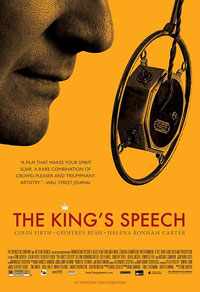
This year's Best Picture winner at the Academy Awards (and nominated for 12 Oscars),was
The King's Speech, the story of King George VI of England who was suddenly forced to ascend the throne when his brother Edward VIII abdicates for love.
The king, the father of the current Queen Elizabeth II, and whose nickname was Bertie (Prince Albert) suffered from a severe stutter which made public speeches excruciatingly difficult. For those who have not seen the film, the story line is about how the reticent king, at the urging of his wife, engages a speech therapist who uses unorthodox methods to treat his speech impediment.
While I thoroughly enjoyed the film, it was painful for me to watch because I was a severe stutterer as a child. I had both physical and psychological responses as I suffered along with the character on the screen. It is difficult to see your life story relived so accurately. Luckily life sometimes imitates art: both Bertie and I overcame stuttering to the point of enduring public speaking.
I ruminated on the triumph during the days directly after seeing the film and, not unexpectedly, found some life's lessons. Empathy is right at the top. In today's political and business climate it is easy to say "I did it, so there is no excuse for you not performing exactly as I do."
Good management suggests valuing diversity and emphasizing individual strengths. It would be boring and self-defeating if every member of a team (any team) had the same strengths, attitudes and roles. It might take communication to find out why an employee is not performing as expected.
Then there is resilience -- the ability to bounce back and be stronger as the result of adversity. Despite a severe case of nerves, Bertie gave a resounding, inspirational speech rallying the country to stand firm in the face of war.
I realized I always had something to say, so as a stutterer, I took up reading and writing and became pretty good at both. My imagination developed exponentially: I can still close my eyes and imagine just about any scene.
I went on to become editor of the school paper, represented the school in the national Spelling Bee and joined the drama club. I also was the science representative on the school's televised knowledge bowl. Talk about stress of public speaking! I still enjoy acting and public speaking.
Whenever a challenge appears in our personal or professional life we can use that challenge to learn coping skills and to even excel. Often the skills learned are transferable to other jobs and areas of life. The more you cope, the more you succeed, the more you learn to cope even more -- even in unrelated circumstances.
Then there is the lesson that no matter our circumstance, we can always find our voice. In our profession we complain a lot about the many things which are done to us. Then we sit back in acquiescence and self-pity. No matter what the challenge, it is us who give others permission to treat us a certain way. Not speaking up is often the loudest endorsement of the status quo. Not everyone is an orator, but we all have a voice. Use it!
